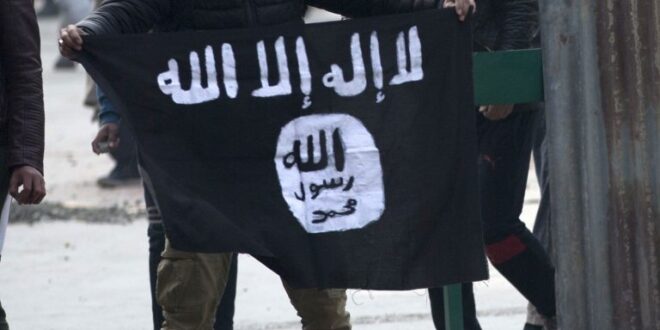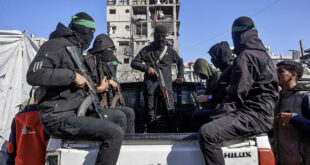Following the recent U.S. Special Forces raid in Syria leading to the death of Islamic State (IS) leader Abu Ibrahim al-Hashimi al-Qurayshi, many are wondering what impact it will have on the group globally.
One likely scenario is that, as the regional groups grow even further decentralized from the core, they will move away from the Islamic State’s global agenda and focus more on local or regional issues.
Considering the rise in prominence of Islamic State Central Africa Province, the next IS leader may attempt to establish a more direct command line between its core and affiliates in Mozambique and the DRC.
Another priority of the new IS emir could be to ramp up external operations as a way of improving morale and showing the world that the group is resilient, capable of more than just low-level guerrilla-style attacks.
Following the recent U.S. Special Operations Forces (SOF) raid in northwestern Syria leading to the death of Islamic State (IS) leader Abu Ibrahim al-Hashimi al-Qurayshi, many are wondering what impact it will have on the group globally. With provinces, branches, and affiliates scattered across multiple regions, IS losing its emir will negatively affect command-and-control and could lead recruitment to suffer, given the uncertainty of its next leader. During his time leading IS, which began after the death of its previous leader Abu Bakr al-Baghdadi in October 2019, al-Qurayshi never publicly addressed his followers. Most experts agree, however, that whoever is selected to lead IS next will be an Iraqi, as both Baghdadi and al-Qurayshi were, and will have military experience and likely connections to Iraq’s Anbar province. Some of the possible successors include Abu Khadija, Abu Muslim, Abu Salih, or Abu Yassir al-Issawi, although there is disagreement over whether al-Issawi is alive or dead.
Any time a terrorist group experiences a leadership transition can be a vulnerable period, with factions competing internally and jockeying for power. In some cases, this can lead to splintering, with hardliners upset over a more moderate selection and breaking off to form a new group. The possibility for defections also increases in the aftermath of the loss of a leader, with IS on alert for any attempts by al-Qaeda affiliates to poach or recruit disenfranchised fighters. One likely scenario, especially if IS takes its time in announcing the selection of a new emir, is that as the regional groups grow even further decentralized from the core affiliates could potentially move away from the Islamic State’s global agenda and focus more on local issues. This occurred with several al-Qaeda affiliates in the mid-to-late 2000s, as Osama bin Laden was isolated and communicating infrequently with leaders of al-Qaeda’s regional branches. In the most extreme case, Jordanian militant Abu Musab al-Zarqawi, the former leader of al-Qaeda in Iraq (AQI), pushed back against al-Qaeda’s then deputy (and current leader) Ayman al-Zawahiri, who was urging al-Zarqawi to tone down AQI’s sectarian agenda, although the latter dismissed the advice of the former.
The next IS emir will take stock of the group’s global presence and attempt to strengthen linkages to regional provinces. Considering the rise in prominence of Islamic State Central Africa Province (ISCAP) in both Mozambique and the Democratic Republic of Congo (DRC), the next IS leader may attempt to establish a more direct and consistent command line between its core in Iraq and Syria and its Central African affiliates. Other African IS affiliates, including Islamic State West Africa Province (ISWAP) and Islamic State Greater Sahara (ISGS), are growing stronger, both in terms of overall numbers and frequency of attacks, but also with respect to controlling territory and implementing jurisprudence. In Afghanistan, Islamic State Khorasan (IS-K) is waging a guerrilla campaign against the Taliban, and following years of losing leaders and territory, it is now enjoying a more permissive operating environment.
Another priority of the new IS emir could be to ramp up external operations as a way of improving morale and showing the world that the group is resilient, capable of more than just waging a low intensity insurgency in sparsely populated border areas in the Levant. Other priorities for the new leader will be to reestablish the Islamic State’s positioning in the broader global jihadist movement. IS’s jihadist rival, al-Qaeda, has benefited enormously from the Taliban takeover of Afghanistan, and according to a recent report by the United Nations, “terrorist groups enjoy greater freedom there than at any time in recent history.” With Western countries shifting focus away from counterterrorism and toward great power competition, and with the world’s attention focused on Russia and Ukraine, jihadist groups will have an even greater opportunity to reassert themselves in fragile states and ungoverned territories stretching from the Sahel to the southern Philippines.
 Eurasia Press & News
Eurasia Press & News




